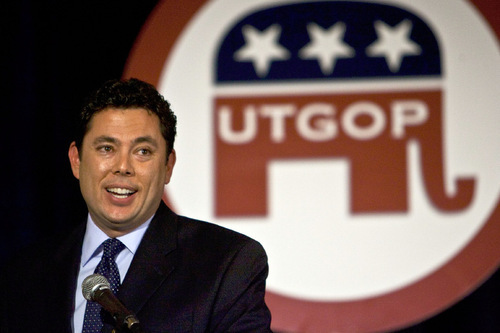This is an archived article that was published on sltrib.com in 2011, and information in the article may be outdated. It is provided only for personal research purposes and may not be reprinted.
Washington • While other members of Congress will be pressing Tuesday to set aside some federal lands as wilderness, Rep. Jason Chaffetz will push legislation to dispose of "excess" swaths of the West to help pay down the federal debt.
Chaffetz's bill would order the Interior Department to sell 3.3 million acres in the West, including 132,931 in Utah.
The two-term Utah Republican cites a 1997 report, which Congress ordered the Clinton administration to produce, listing public lands that were not otherwise set aside for oil and gas or mineral extraction or that were not currently in the pipeline for wilderness consideration or protection.
"While there are national treasures worthy of federal protection, there are lands that should be returned to private ownership," Chaffetz said in introducing his legislation earlier this year. "If the land serves no public purpose and is 'identified for disposal,' let's return it to private ownership."
Chaffetz said the sale would equate to barely 1 percent of Bureau of Land Management area and less then a half a percent of all federal lands. In addition to Utah, the bill would affect public lands in Arizona, Colorado, Idaho, Montana, Nebraska, Nevada, New Mexico, Oregon and Washington.
Most of the Beehive State acreage would come from rural areas in southern Utah, and the sale statewide would bring in more than $16 million, according to estimates by Chaffetz's office.
His legislation will be heard Tuesday by a House subcommittee led by Utah Republican Rep. Rob Bishop.
Critics note Chaffetz's measure comes in stark contrast to legislation by several of his Republican colleagues to expand wilderness protection in the West.
"Selling off our public lands to reduce the deficit would be like selling the house to pay the light bill," said Philip Carlson, Utah coordinator for the group Republicans for Environmental Protection. "America's public lands are a lasting endowment that supports local economies. They're magnets that attract sportsmen, backcountry trail riders, hikers and campers year after year. It makes no sense to sell off this endowment, especially in a down economy."
Carlson notes that the Outdoor Industry Foundation estimates that outdoor recreation returns about $730 billion a year to the economy and helps to employ 6.5 million people.
The Clinton administration noted in the 1997 report that some of the lands that it identified per Congress' instructions may have other conflicts that would preclude them from being sold, including disposal costs, the existence of cultural resources, mineral claims or leases and hazardous conditions.
First-term Sen. Mike Lee, R-Utah, has introduced in the Senate a companion bill to Chaffetz's measure.



